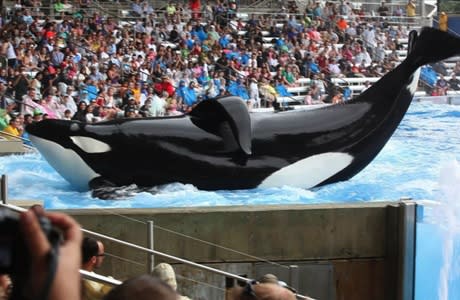If 1977's Orca from director Michael Anderson taught us anything, it's that killer whales are best left alone. Yet, here we are in 2013 and these massive creatures – some weighing upwards of 6 tons—continue to be held in captivity for the amusement of park visitors.
Such is the case of Tilikum, who has been held captive since 1983 where he started out "performing" at Victoria, British Columbia's Sealand of the Pacific park.
After a series of unfortunate events that saw one employee killed and the park eventually shut down, Tilikum was shipped down to SeaWorld in Orlando, Florida, where he has been linked to two other deaths. Still, he continues to make the occasional public appearance at shows and is used for very lucrative, sperm-producing and breeding purposes.
The most recent incident that caught the world's attention was in 2010 when he pulled his trainer, Dawn Brancheau, into the pool and proceeded to drown and crush the woman much to the horror of a packed audience. Brancheau, seen as a professional that spent half of her young life working with sea mammals, was the last person fellow employees would have ever expected to pass in this manner.
Gabriela Cowperthwaite's scathing documentary, Blackfish (the name given to killer whales by Native Americans) looks into Brancheau's death and reveals the whale-as-entertainment industry for what it really is. Detailing capture methods, a string of incidents at various parks from around the world, strains of captivity for these enormous creatures, as well as testimonials from the marine biology world that confirm the high level of intelligence of whales, Cowperthwaite covers all the bases and provides an exposé that is, at times, heartbreaking to watch.
While unavoidable—SeaWorld obviously refused to provide comment—Blackfish provides a slanted view and features a slew of talking head interviews that continuously preach the evils of using large mammals for entertainment. A group of ex-trainers speak candidly about their experiences while working in the parks, sharing cringe-worthy tales that might make viewers think twice the next time they see a SeaWorld commercial on television.
Tightly edited and well structured, Cowperthwaite has assembled a documentary that, while rooted with a tragic theme, is highly engaging and accessible. While an impressive amount of information has been packed into the 90-minute runtime, it isn't overwhelming, thanks in large part to the charismatic and articulate interview subjects that provide such compelling tales.
Blackfish has the capacity to stand the test of time as a gripping documentary synonymous with changing the way people see both killer whales and the multi-billion dollar industry that continues to exploit killer whales as playful tourist attractions.
(Magnolia)Such is the case of Tilikum, who has been held captive since 1983 where he started out "performing" at Victoria, British Columbia's Sealand of the Pacific park.
After a series of unfortunate events that saw one employee killed and the park eventually shut down, Tilikum was shipped down to SeaWorld in Orlando, Florida, where he has been linked to two other deaths. Still, he continues to make the occasional public appearance at shows and is used for very lucrative, sperm-producing and breeding purposes.
The most recent incident that caught the world's attention was in 2010 when he pulled his trainer, Dawn Brancheau, into the pool and proceeded to drown and crush the woman much to the horror of a packed audience. Brancheau, seen as a professional that spent half of her young life working with sea mammals, was the last person fellow employees would have ever expected to pass in this manner.
Gabriela Cowperthwaite's scathing documentary, Blackfish (the name given to killer whales by Native Americans) looks into Brancheau's death and reveals the whale-as-entertainment industry for what it really is. Detailing capture methods, a string of incidents at various parks from around the world, strains of captivity for these enormous creatures, as well as testimonials from the marine biology world that confirm the high level of intelligence of whales, Cowperthwaite covers all the bases and provides an exposé that is, at times, heartbreaking to watch.
While unavoidable—SeaWorld obviously refused to provide comment—Blackfish provides a slanted view and features a slew of talking head interviews that continuously preach the evils of using large mammals for entertainment. A group of ex-trainers speak candidly about their experiences while working in the parks, sharing cringe-worthy tales that might make viewers think twice the next time they see a SeaWorld commercial on television.
Tightly edited and well structured, Cowperthwaite has assembled a documentary that, while rooted with a tragic theme, is highly engaging and accessible. While an impressive amount of information has been packed into the 90-minute runtime, it isn't overwhelming, thanks in large part to the charismatic and articulate interview subjects that provide such compelling tales.
Blackfish has the capacity to stand the test of time as a gripping documentary synonymous with changing the way people see both killer whales and the multi-billion dollar industry that continues to exploit killer whales as playful tourist attractions.
